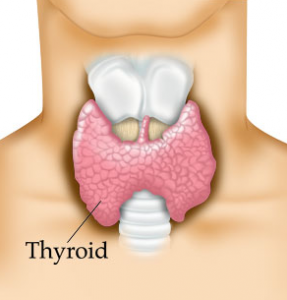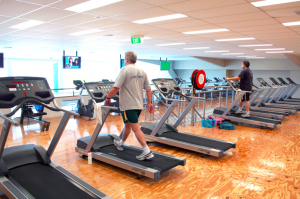14 Mar Your Thyroid…Is It Holding Back YOUR Weight Loss? Hypothyroidism, Hashimoto’s, and more
**this blog was originally published March 14, 2012 but was updated on December 31, 2015**
Your Thyroid…Is it holding back your weight loss?
Hypothyroidism, Hashimoto’s and More
Don’t resign yourself to having a slow metabolism forever! You may want to hear what guest blogger Ari Whitten has to say about overcoming low thyroid hormone levels and a slow metabolism, getting your energy back and losing fat.

Ari is the best selling author of Forever Fat Loss and the creator of cutting-edge program The Energy Blueprint. (By the way, he’s got an incredible FREE training on how to increase your energy levels. It’s a MUST WATCH for anyone who cares about being healthy, increase their energy or wants to lose fat. You can sign up for that 100% FREE Virtual Training HERE.)
DISCLAIMER: Ari Whitten does not claim to be diagnosing, treating or curing hypothyroidism. If you have, or suspect you have hypothyroidism (or any other disease), please see your doctor and take appropriate action. Physicians are in the realm of diagnosis and treatment of disease using medication. Ari’s advice and programs are not meant as a replacement for proper medical care–they are a complement to it. They are lifestyle and nutrition-based strategies designed to enhance metabolic health and improve overall energy levels, vitality, and cause fat loss.
Hypothyroidism, and Hashimoto’s; what is the difference, and does it play a roll in your weight loss challenge?
Have you been eating clean, exercising regularly, but still GAINING weight? Are you feeling lethargic and a little depressed?
It could be your thyroid. The thyroid gland releases hormones that affect nearly every part of your body and if there is something wrong with it, losing or gaining weight can be more challenging.
Hypothyroidism and the Dreaded Slow Metabolism
Thyroid hormone is the key to the metabolism lock. If you have low thyroid production, every aspect of your cell function will slow down… you will have a SLOW metabolism. Having a “slow” metabolism is not a fun place to be.
How do you know if you’re dealing with hypothyroidism or a slow metabolism?
First of all, getting a diagnosis is something that is done between you and your doctor based on blood test results.
But it is estimated that there are tens of thousands of undiagnosed cases in the U.S. at any given time. So if any of the following symptoms sound like you, you may want to see your doctor and get your thyroid levels checked:
- You are constantly watching your calorie intake and exercising hard, and still failing to see any fat loss.
- You continually lose and regain the same 10, 20, or 30 pounds over and over again as the years go by.
- You are cold, and fatigued much of the time.
- You have poor digestion or digestive problems like constipation.
- You have trouble sleeping.
- You have low libido and/or have trouble coming to orgasm.
- You are depressed, irritable, and/or anxious and/or have mood problems much of the time.
- You constantly feel sluggish and low in energy.
- If so, then you may have a dysfunctional metabolism (a.k.a. “slow” metabolism).
My intention with this post is not to diagnose or treat your hypothyroidism, but to offer you lifestyle and nutrition strategies that may improve your body composition and quality of life.
The most common stories I get from people sound something like this:
“I am eating less than 1,500 calories each day, I am restricting carbs, eating tons of green veggies, eating clean, and I do cardio each day plus intervals/resistance exercise. Yet, I can’t seem lose fat! I have low energy and fatigue a lot of the time, and my hormones seem a bit off (though my doctor says everything’s in the normal range). It would be hard for me to eat any cleaner than I already do or do more exercise…What do I do? How do I fix my metabolism?”
One thing you should know right now: the solution is NOT more diet and exercise
Metabolism dysfunction is a massive epidemic that is causing absolutely enormous amounts of unneeded suffering.
The most common way that hypothyroidism and slow metabolism develops is in a condition known as Hashimoto’s Disease, which is considered to be an auto-immune disease where the body’s immune system begins destroying the thyroid gland.
With a thyroid gland being progressively eaten up by the body’s immune system, the natural result is hypothyroidism, and the slow metabolism that goes along with that state of physiology
As a result of that progressive destruction of the thyroid gland, all sorts of symptoms–like the list mentioned above–can result.
Are you overweight just because you’re lazy and you eat too much, or is it your thyroid?
Because many of the common symptoms of a slow metabolism–fat gain, fatigue, lack of energy, depression, etc—often overlap with symptoms seen in many overweight people, people with these issues sometimes get lost in the shuffle and many trainers and nutritionists today may assume that their issues are simply the result of GLUTTONY and SLOTH (that is, from people being lazy and lacking self-control around eating). Thus it’s no uncommon for people with very real thyroid or metabolic health issues to have their problems brushed off as mere gluttony and sloth.
So unfortunately, there are cases where instead of treating the biological dysfunction that is causing these problems, we end up unknowingly just blaming the victim instead of actually addressing the biological dysfunction driving their symptoms.
It is NOT about being lazy!
There are literally millions of people are suffering from fat gain, depression, low energy due to a slow metabolism, and the problem is that we have an entire industry of fitness, and nutrition professionals who have little knowledge of how nutrition and lifestyle factors relate to this condition. Moreover, much of what they are doing to help “speed up the metabolism” for these people is actually COUNTERPRODUCTIVE!
And when I say this, I am including almost everything you can find in books (like The Fast Metabolism Diet) and countless online articles claiming to have “10 tips to speed up your metabolism.” All the “don’t eat dairy, don’t eat corn, eat cayenne pepper, drink a gallon of water a day, and eat meals every two hours” type of stuff. Most of the information people are putting out there on the metabolism can actually be counterproductive for someone with metabolic/thyroid health issues.
Many of the things which have been promoted as being “healthy” or “good for fat loss” in recent decades can actually CONTRIBUTE to metabolic and hormonal dysfunction.
This means, that this isn’t just a problem that affects sedentary people or people eating a junk food diet—this is a HUGE problem among the people who are the most health conscious!
Let me give you just a small sample of things that many health conscious people engage in that are themselves, the very things causing the metabolic and hormonal dysfunction:
1. CARDIO
Cardio has been heavily promoted in recent decades as being good a great way to lose fat.  However, numerous studies have now shown that cardio is actually an extremely ineffective way to lose fat.
However, numerous studies have now shown that cardio is actually an extremely ineffective way to lose fat.
For example, researcher Alan Utter had this to say after examining all the studies ever conducted on the subject: “Moderate aerobic exercise training has a minor, nonsignificant effect on fat mass.” [1]
Another researcher had this to say: “Despite the popular support for aerobic training, it does not appear to significantly accelerate fat loss, even when combined with a low calorie diet.” [2]
The real point here is that not only do we already know that cardio is NOT a good way to lose fat, numerous studies have now shown that doing lots of cardio is an extremely good way to lower your thyroid hormone levels! Not to mention sex hormone/fertility problems, and hypercortisolism (excess stress hormones). [3] [4] [5] [6] So, if you want a slow metabolism and hormone problems, doing 1-2 hours of cardio each day is a great way to get it!
Be very cautious with doing large amounts of cardio if you have hypothyroidism.
2. LOW CALORIE EATING
Chronic low calorie eating–chronic calorie counting and trying to keep calories low–is also a phenomenal way to give yourself low thyroid levels and feel fatigued all the time. [7] Nothing will make your thyroid levels drop faster than calorie restriction.
Be careful with chronically restricting calories!
3. LOW CARB EATING
Chronic carbohydrate restriction—low carb eating–is also a great way to give yourself low thyroid levels. [8] [9]
Occasional low-carb dieting can be fine, but be very careful with chronic carbohydrate restriction!
4. HIGH VEGETABLE OIL FAT INTAKE
For the last 5 or 6 decades, we’ve been told “Don’t eat saturated fat—it’s bad for you and causes heart disease! Have some heart-healthy vegetable oils instead.” These supposedly “heart healthy” vegetable oils that many people cook with and use in dressings and sauces—oils like canola oil, grapeseed oil, corn oil, margarine, soy oil, and sunflower oil—are not only NOT healthy, and they can promote inflammation over time, which damages thyroid and metabolic health. [10] [11]
More subtly, but still problematic for many people, nut butters and nut milks—things like almond milk and almond butter which are dense with omega-6 polyunsaturated fats—when consumed as staples in the diet, can also contribute to low thyroid levels and metabolic dysfunction.
5. VEGGIES NOT PREPARED PROPERLY.
Many varieties of green vegetables, believe it or not, can actually contribute to hypothyroidism–such as raw or  undercooked cruciferous vegetables (broccoli, cauliflower, cabbage, kale, etc).[12] “Green vegetables–unhealthy? No, I can’t believe it!” Well, if you eat raw or undercooked cruciferous veggies, you better believe that it can contribute to thyroid problems and fatigue.
undercooked cruciferous vegetables (broccoli, cauliflower, cabbage, kale, etc).[12] “Green vegetables–unhealthy? No, I can’t believe it!” Well, if you eat raw or undercooked cruciferous veggies, you better believe that it can contribute to thyroid problems and fatigue.
Cruciferous veggies are fine to eat, but make sure to cook them first! Don’t eat large amounts of raw cruciferous vegetables if you have low metabolic rate or thyroid issues.
6. GUMS AND CARAGEENAN
Many pre-packaged products like dairy-free milks and tons of other pre-packaged health foods (and junk foods) contain significant amounts of gums and carageenan. These substances can interfere with normal gut health and microbiome (the bacteria living in your intestines) and promote inflammation and fat gain. [13] More research is needed, but this is likely a very important factor to address if your goal is good metabolic health and body composition.
Try to eat whole foods without these ingredients, and find pre-packaged varieties that don’t use these substances.
Doing it to ourselves
Now if we just stop there (and there are several more examples of ways health conscious people do things that are counterproductive), but just looking at the above 6 examples of things that health conscious people often do because they think they are “healthy.” If you combine several of those 6 things, you have a potent recipe for giving yourself hormonal dysfunction, and a slow metabolism.
Do those things for years, and you will create a situation where you are eating hardly anything, doing tons of exercise everyday, and your body may STILL extremely resistant to losing fat.
Most people who want fat loss go about it by using the strategy of constantly trying to deprive their body of calories through the “eat less calories and burn more calories” approach. Over time, following this approach essentially trains the body into metabolic slowdown—and your body actually learns to function on a lower baseline level of calories. (A lower level of “caloric flux.”)
So whereas before you might have been burning and taking in about 2,000 calories a day, now, after many years of chronically trying to take in less calories and do more exercise (just as everyone in the fat loss industry tells you to do), you find yourself with a slow metabolism, and a body that takes in and burns only 1,400 or 1,500 calories per day.
For example, a recent study found that participants on The Biggest Loser TV show have dramatically slower metabolic rates after the show is over and they’ve lost all that weight—the study found that they were burning over 500 calories less per day than when they were obese!
The study also found that over 90% of Biggest Loser participants gain back all the weight they lost during the show! [13] [14]
Why? Simple: The metabolic slowdown! If you start off burning and taking in about 2,000 calories each day, then all the sudden—from all the dieting and exercise you’re doing—your metabolism slows down so you’re only burning 1,500 calories each day, well, now what happens is that you can actually get FATTER on a LESS food than your normal diet!
One of the common ideas you hear to “boost your metabolism” is to do exercise. Yet, as you can see in this group, even doing large amounts of exercise, if your calorie intake is low, there will be no metabolism-boosting effect–you will only see metabolism slowdown.
This is why so many people continually spin their wheels in a cycle of losing and regaining the same 10, 20, or 30 pounds, year after year.
And it’s why many health conscious people often find themselves in a situation where they’re doing tons of exercise, and eating clean, yet still failing to see any fat loss. When you train your body into a LOW CALORIC FLUX through chronic calorie restriction, you may lose fat initially, but then your body becomes EXTREMELY resistant to further fat loss–even while eating hardly anything and doing tons of exercise.
What is the solution?
Well, contrary to the conventional recommendations in the weight loss industry, the solution out of this mess is NOT as simple as “eat less and burn more.”
In fact, the real solution for these chronic dieters and over-exercisers who have a slow metabolic rate is VERY counter-intuitive to the point that you might even find it shocking.
The foundational work that needs to be I do with people is getting them OFF cardio, eating MORE calories, shifting to better types of exercise, introducing more gentle movement, and (for those on low-carb diets) eating MORE carbs (from the right sources).
In short, it involves doing many things in the exact opposite way from what most people are doing.
Instead of using the strategy of trying to create a lean body through starving the body of calories, I recommend using the strategy of elite athletes–maximizing BOTH calories in and calories out and having a raging fast metabolism that creates leanness without relying on having to eat hardly anything each day.
The real solution to metabolism dysfunction is most definitely NOT as simple as “eat less and burn more.”
The real solution is to start training your body to function on a higher baseline level of calories, replacing cardio with more efficient and less harmful types of exercise, and maximizing cellular energy production (a.k.a. speeding up your metabolism) through a super nutrient dense whole foods diet that provides your cells with all the macronutrients (in the right ratios) and micronutrients (the right types in the right amounts) that cells need for a fast metabolic rate.
That’s the foundation. From there, there are several strategies to dramatically speed up the process of creating a faster metabolism.
But it all starts with less thyroid slowing ways of eating and exercising, and MORE calories.
Get leaner by eating MORE and exercising less than you do now? Impossible, you say?
Not if you do it right. In fact, for people who have already trained themselves into metabolic dysfunction from chronic calorie restriction and overexercising, it is the ONLY way to get leaner.
So where do you start?
Well, if you suspect that you have thyroid issues, it’s always smart to check with your doctor and get blood tests.
(Note: This article and Ari Whitten’s products do not claim to be a diagnosis, treatment, or cure for hypothyroidism, or a replacement for proper medical care from your doctor for your hypothyroidism. Always seek and follow medical advice from your physician if you have hypothyroidism. Ari’s programs are designed to address the nutrition and lifestyle factors related to low thyroid levels that are commonly not addressed by people looking to improve their thyroid or metabolic health. It is a complement to–not a replacement for–proper medical care from a physician)
Are you ready to take your body and energy to the next level?
Ari has put together what may just be the most advanced and cutting-edge, science-packed health program in the world. It’s called The Energy Blueprint and people are absolutely raving about it. He offers an amazing “Overcome Fatigue and Double Your Energy” FREE Virtual Training course that is a MUST WATCH for anyone who cares about their health and wants more energy. You can sign up for that HERE.
___________________________
If you’re looking to improve your body and your energy levels, make sure to sign up for Ari’s incredible FREE “Double Your Energy” Video Training course HERE.
[1]Utter, A.C., Nieman, D.C., Shannonhouse, E.M., Butterworth, D.E., & Nieman, C.N. (1998). Influence of diet and/or exercise on body composition and cardiorespiratory fitness in obese women. International Journal of Sport Nutrition, 8, 213-222.
[2]Finn, C. (n.d). Aerobic exercise: Does it really speed up fat loss?. Retrieved from http://www.timinvermont.com/fitness/aerobic.htm
[3] http://www.ncbi.nlm.nih.gov/pubmed/19753538
[4] The effects of maximal aerobic exercise on cortisol and thyroid hormones in male field hockey players.
[7] Spaulding SW, et al. Effect of caloric restriction and dietary composition of serum T3 and reverse T3 in man. Journal of Clinical Endocrinology & Metabolism, Jan, 1976; 42 (1): 197–200.
[8] Davidson MB, Chopra IJ. Effect of carbohydrate and noncarbohydrate sources of calories on plasma 3,5,3′-triiodothyronine concentrations in man. Journal of Clinical Endocrinology & Metabolism, Apr, 1979; 48 (4): 577–581.
[9] Fery F, et al. Hormonal and metabolic changes induced by an isocaloric isoproteinic ketogenic diet in healthy subjects. Diabetes & Metabolism, Dec 1982; 8 (4): 299-305
[10] http://www.ncbi.nlm.nih.gov/pubmed/8960090
[11] http://raypeat.com/articles/articles/unsaturatedfats.shtml
[12] Freedhoff, Y. (2012, April 26). The biggest loser destroys participant’s metabolism. Weighty Matters. Retrieved from http://www.weightymatters.ca/2012/04/biggest-loser-destroys-participants.html
[13] http://www.nature.com/nature/journal/v519/n7541/full/nature14232.html
[14] Freedhoff, Y. (2013, January 23). When science met the biggest loser. Health. Retrieved from http://health.usnews.com/health-news/blogs/eat-run/2013/01/23/when-science-met-the-biggest-loser


